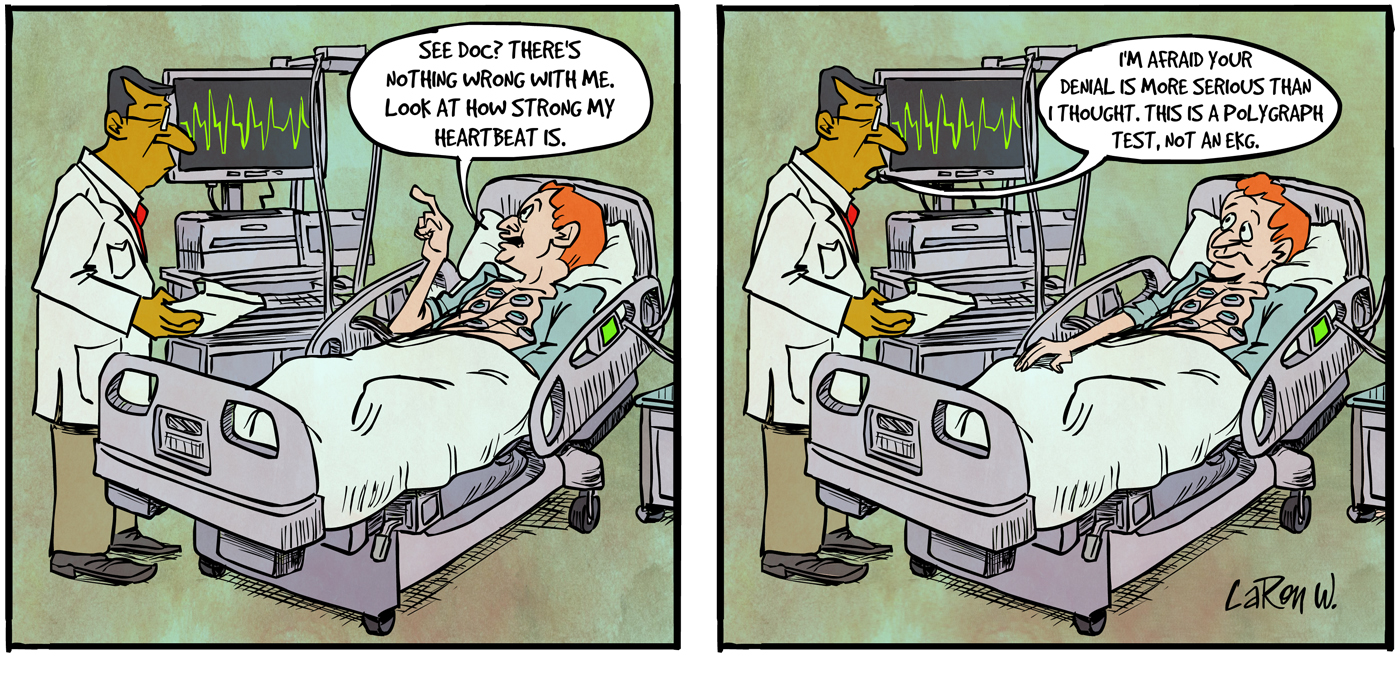
I didn’t think I could ever get sober. But “God could and [did when I sought Him]” (AA 60), and He does for [me] what [I] could not do for [myself] (AA 84).
The White Book assures me, “…we started sharing at meetings, telling our story, bringing the inside out. And we discovered that the way to feel better is not only going to meetings but taking the risk of self-disclosure” (SA 65). This is my story in addiction and in recovery.
As a child, I fantasized about romance and deep belonging. I grew up in a religious family. My parents were successful in their careers, my sister and I never saw them fight, and they were never abusive. I still don’t understand how I turned out the way I did when I was never exposed to bad behavior.
My parents wanted me to be a good person, but I think it was on me that I felt so controlled by their moral and religious views. It just seemed too much for me. I felt emotionally disconnected from them and never comfortable talking about serious matters—I didn’t even give them a chance. They expressed their love for me, but it wasn’t how I wanted it. I didn’t think I was good enough, that I had to be someone else so they’d feel proud of me as their daughter. Having some recovery now, I’ve learned that they did love me, and they gave me everything they could. They still do.
When I was a child, we moved to another Arab country for two years for my father’s job. I cried about leaving my family and friends, but I learned to adapt to a different environment. I was 14, far from relatives and my school friends in Egypt. I started engaging with people online and making virtual contacts. I made a lot of “friends” with whom I’d talk for hours at a time. Soon I was leading a double life.
My family didn’t know anything about this other life, and I lied when asked. I began to feel I didn’t belong in my family, especially in regard to religious and moral matters. Because I felt like a bad, disobedient person, I didn’t think God loved me, either. I felt like a hypocrite because I still prayed and wore clothes appropriate to our religious tradition, but inside I wanted a different life and felt confused by the conflict I felt. I developed fear and anger toward authority figures, including the clergy. I felt resentful of male authority, especially my father, who seemed to always be telling me how I should act. I felt something was wrong with me when I saw girls with good relationships with their fathers; they seemed to have love, intimacy, and communication. My addiction was already taking hold.
I went to an all-girls high school, and all the staff were female. I felt closed off from society, and I was drawn to the more rebellious girls. I was only 15 the first time I masturbated to porn. It started as simple curiosity, and I was disgusted. But then I loved it and sought it out more and more frequently. We plugged in by drinking in the pictures, the images, and pursuing the objects of our fantasies. We lusted and wanted to be lusted after (SA 203).
I got engaged at 18 because I wanted independence from my family, to feel free to do anything I wanted. One day I told my mother that although I loved my father, I would not marry someone like him. So I found someone who wasn’t religious but more open minded and seemed like what I wanted. I was already full of lust, though, and I couldn’t be faithful to him, either before or after our wedding. I felt neither regret nor shame in betraying him. It was true for me that “the only way [I] knew to be free of it was to do it” (SA 203). I was drawn to crude people who smoked (unlike my family), used bad words, and enjoyed lots of casual sex. I saw them as “adventurous.” I found normal people boring (like my family).
I told my fiancé that I watched porn occasionally, but I said nothing about sleeping with real people, but he figured out soon enough that I was cheating on him. I later learned he was doing the same thing to me. Our relationship was bad, but we just kept moving toward marriage.
I stopped all my online affairs six months before the wedding and got married at 21. I didn’t act out with anyone for the first three years of marriage, but masturbation and porn continued. I began to hook up again after a few months, but the guilt and shame were heavier being married. …we were driven ever inward, away from reality, away from love, lost inside ourselves (SA 203).
During intimate time with my husband, I fantasized and thought of other men I’d been with. I couldn’t stay in the here and now. I wondered if “normal people” thought of others when intimate with their spouses. Was it possible not to? Sometimes I wondered if I was with my husband for him specifically or because he was the only one available. I was never sure, and I realized my habit[s] made true intimacy impossible. [I] could never know real union with another because [I was] addicted to the unreal (SA 203).
From 2014 to 2016 I searched for ways to stop lusting and sexually acting out. I came across a video of an Egyptian man who said he was “a recovering porn addict.” I later learned he was a member of SA. Mere information didn’t stop me, but it was my seed of awareness. I found more and more about porn addiction, and I read articles that described the dark side of the porn industry and the terrible suffering of those involved. Then I got religious again and stopped for three months, only to relapse because my grandmother passed away, and within a month, I was talking to strangers on a daily basis again. I thought it was “just for fun,” but the behavior progressed like addiction always does.
From 2016 to 2023, I hit bottom several times. I talked to a lot of men, crossed a lot of boundaries, and violated all my principles and values. My rebellious, atheistic thinking produced questions like: Why did God create me without asking if I wanted to live? Why does suffering exist? Why should I continue on if the ending is already written for me? Why is the problem easy and the solution so difficult? I stopped praying, which was very painful for me as someone who had prayed regularly since childhood.
On one occasion after my son had gone to bed, I woke him up laughing with a man on the phone. My son asked who I was talking to, and I told him “she” was my friend. He said, “Her voice is very strange.” I felt extreme shame, that I was a bad person, and that my son deserved a better mother. When my children got sick, I felt God was punishing me. This produced guilt, self-hatred, remorse, emptiness, and pain (SA 203).
In 2022 I stopped watching porn and masturbating for seven months, but then I fell into another dependent relationship with a man. I would meet him in public places near my home, and anyone who knew me could see what was going on. Inevitably I relapsed, and after a long reprieve, I was again despondent. I resumed fantasizing about cheating scenarios I saw in movies and only saw a deep, dark bottom ahead. Thank God I didn’t dig deeper.
I joined Sexaholics Anonymous in April 2023. I was 31. I shared my story with an SA sister who first welcomed me. She helped me believe there was a solution and that it was in the Fellowship. I was encouraged that one fellow had almost three years of sobriety. Several others with sobriety shared their stories in that first meeting. We couldn’t see the path ahead, except that others had gone that way before (SA 204).
I went to meetings and introduced myself as a “sexaholic,” but I still didn’t think I was one of “them.” I attended Zoom meetings daily, and I participated. In my first week of SA, one meeting was a Step One giveaway. This person had done things I had never even thought of, so I figured I must not be a sexaholic after all. Soon thereafter, I told a fellow with 10+ years of sobriety that my acting out consisted only of cyber sex. I think he sensed how I was minimizing because he said the only requirement to belong in SA is a desire to stop lusting and become sexually sober. He continued by saying the White Book doesn’t specify any acting out behaviors that qualify us, and that it’s only about lust. Lust is the umbrella under which falls all other behaviors.
I found a sponsor, started reading about Step One, attended and participated in meetings regularly. But I was still seeing someone I had acted out with. Of course that led to acting out twice in my first month of SA. Half measures availed us nothing (AA 59).
In May of 2023, I asked my current sponsor to work with me, which is one of my best-ever decisions. I was depressed and desperate at the time. She told me I was not alone in this, and after I briefly told her how I acted out, I promised to hang up the phone and immediately block the person I was still with. She didn’t tell me to do so, but I wanted sobriety now more than ever.
I asked her how I would be able to live without talking to men? She told me to pray and reach out every time I had a temptation, that is, reach out to women who are in SA (not men and no one who’s not in recovery). This practical tool helped me learn how to surrender lust. The most important advice for me at the time was to attend meetings, ask for help, and start reading about Step One. Each new step of surrender felt it would be off the edge into oblivion, but we took it. And instead of killing us, surrender was killing the obsession! (SA 204)
The day after my first call with my new sponsor, I had a fight with my husband, and we stopped talking. A week later, my sponsor asked, “Have you spoken to any men?” I smiled on the inside when I told her, “No, not at all!” We discovered that we could stop, that not feeding the hunger didn’t kill us, that sex was indeed optional (SA 204).
I was strict in the beginning about interacting with men in SA. I avoided mixed groups for the first month. I focused on improving my relationships with women. I began taking service positions when I was only 10 days sober. The fellowship gave us monitoring and support to keep us from being overwhelmed, a safe haven where we could finally face ourselves (SA 204).
I committed to attend daily zoom meetings no matter the circumstances. This meant signing on whether I was at home, at the gym, in the car, playing football with my son, or at the beach. I also attended in-person meetings and made daily Program calls. I finished reading about Step One and wrote out my personal story.
One day I told my husband what I had stopped doing. I asked if he had noticed anything different. He said, “yeah, you wear headphones a lot and pay more attention to what I say.” I grinned and told him about SA, that I had a sponsor and was working the Steps. We talked for a whole hour. He agreed to attend a face-to-face meeting on his own.
After two months of sobriety, I gave away my Step One inventory to my home group. When I had worked Steps Two & Three and started Four, I began sponsoring others after I had four sober months. I worked on Steps Six & Seven and daily discovered defects of character that were really there all along. Each discovery explained a lot to me about choices I had made before recovery. I found it especially difficult when my defects became apparent in family and home life. As we faced our defects, we became willing to change; surrendering them broke the power they had over us (SA 205).
After I took my six-month chip, I was asked to join an SA translation committee (English to Arabic). I treasured this opportunity to be of service. After another month of sobriety, God gave me an opportunity to present at an Arabic speaker meeting.
In the following months, I made direct amends to my parents, my sister, and two friends from college. Gifts I got in making amends included my mother telling me it wasn’t only my fault and my father telling me to “take it easy and keep it simple.” It turned out they are not as angry with me as I had thought; they actually love me, and everything they do says so. I’m so grateful for them now; I see them through different lenses. In making another amends with an old friend, she said, “I don’t remember what you’re talking about, but all I know is that I love you.” I cried telling my husband about making amends and how I was learning that people love me just as I am. At each amends more of the dreadful load of guilt dropped from our shoulders, until we could lift our heads, look the world in the eye, and stand free (SA 205).
In recovery, nothing changed around me, and it didn’t have to—not my husband nor my children. But my attitude has changed! And it’s all because of the grace of God by sobriety and working the Steps. I completed Step Twelve with my sponsor after about eight months in the Program. I’ve also been attending our monthly intergroup meetings. They’ve taught me a lot, including the meaning of unity, service, and recovery. We were learning how to give; and the measure we gave was the measure we got back (SA 205).
My current recovery focus is on my children and making prompt amends to them when I make a mistake. I pray that God will help me do the next right thing every time I mess up by applying Steps Ten and Eleven in everyday situations. By regularly working Step Twelve, I can expect this Promise to be fulfilled, No matter how far down the scale we have gone, we will see how our experience can benefit others (AA 84).
Today I feel free. I am not afraid someone will discover me on the phone with someone I’m ashamed to be talking with. Today I have nothing to hide. I sleep at night feeling confident and satisfied with myself. We are going to know a new freedom and a new happiness (AA 83).
I have been sexually sober according to the Fellowship’s definition for one year—one day at a time. I’ve been free from pornography for a year and a month, the longest ever for me.
A month ago, a former sex partner sent me a message on WhatsApp wishing me a good time during a religious event. I knew this man for six years. When I saw his name this time, I felt like the Big Book says: “If tempted, we recoil from it as from a hot flame. We react sanely and normally, and we will find that this has happened automatically” (AA 84-85). I “book-ended” with an SA sister as I blocked him. I haven’t contacted any former acting-out partners for more than six months. I have progressive victory over lust. This is a true miracle for me.
I’m just like every other sexaholic. I’m no more or less than anyone else. It is the opposite of where I came from, the egomaniac with the inferiority complex. In recovery, I strive for balance. God created me and sees me as worthy and has made the Fellowship available to me. Therefore, I try to see myself through God’s eyes and show gratitude for the opportunities and gifts He places in my path.
My sponsor always encourages me to be authentic, and she teaches by example. I can now accept not being perfect. My sobriety is not perfect. Lust still hits me sometimes, and I cannot always differentiate between love and lust. I am free from obsession but not from temptation. It’s okay to make mistakes because I’m not God (thank God!), but I strive to grow. The more honest I am, the more sober I will be. We were making the real Connection. We were home (SA 205).
Lily R., Cairo, Egypt






